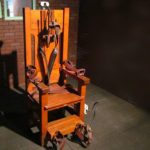LITTLE ROCK—A North Texas pastor joined leaders of the Cooperative Baptist Fellowship in publicly defending a pastor’s right to participate in a religiously motivated protest against the death penalty while also serving as a judge.
George Mason, pastor of Wilshire Baptist Church in Dallas, joined other faith leaders in a June 9 rally on the steps of Arkansas capitol to defend Wendell Griffen.
 Wendell Griffen Griffen, pastor of New Millennium Church in Little Rock and Pulaski County circuit judge, joined a Good Friday protest against capital punishment—the same day he ruled against some state executions.
Wendell Griffen Griffen, pastor of New Millennium Church in Little Rock and Pulaski County circuit judge, joined a Good Friday protest against capital punishment—the same day he ruled against some state executions.
The Arkansas Supreme Court subsequently vacated his order and affirmed a request by Attorney General Leslie Rutledge to remove Griffen from any capital cases.
He faces disciplinary action from the Arkansas Judicial Discipline and Disability Commission for participating in the anti-death penalty protest, in which he lay strapped to a cot outside the governor’s mansion to symbolize an executed prisoner.
“In solidarity with Jesus, the leader of our religion who was put to death by crucifixion by the Roman Empire, I lay on a cot as a dead man for an hour and a half,” Griffen wrote later.
‘This is how democracy works’
At the June 9 rally on the state capitol steps, Mason and other faith leaders defended Griffen’s right to express his faith freely and exercise free speech.
“Religious liberty is good for everyone, but it is easier in theory than in practice,” Mason said. “When Judge Griffen exercised his religious freedom to protest the death penalty in a nonviolent way, he modeled for us precisely the kind of dissent we must protect. That protest was his right, and the manner in which he protested was also right.
Sign up for our weekly edition and get all our headlines in your inbox on Thursdays
“Religiously motivated moral dissent should provoke reflection, not reaction or retaliation. This is how democracy works. When any subject is off limits or any citizen is limited in exercising free speech, democracy does not work.”
Stephen Reeves, associate coordinator of partnerships and advocacy at the Cooperative Baptist Fellowship, affirmed Griffen’s willingness to serve in public office and maintain his Christian calling to ministry.
“Thanks to our Constitution, Judge Griffen need not sacrifice his faith in order to be a dedicated public servant, nor should he be asked to give up his calling as pastor to New Millennium,” said Reeves, former director of public policy for the Texas Baptist Christian Life Commission. “In fact, we need more Christians and more elected officials that understand this distinction and live with similar dedication.”
‘Freedom of conscience is not a luxury’
Suzii Paynter, executive coordinator of the Cooperative Baptist Fellowship, pointed to religious liberty—as enshrined in the First Amendment to the U.S. Constitution—as the “first freedom” that “provides protection for all.”
“Freedom of conscience isn’t a luxury. It is a bedrock,” said Paynter, former director of the Texas CLC.
“Those who serve in government are not disqualified from having religious beliefs and exercising their religious beliefs in ways that are protected by law. … Judge Griffen was entitled to practice his religion on Good Friday. He was entitled to practice his religion as a follower of Jesus with other members of New Millennium Church. He was entitled to practice his religion, even if others disapprove of the way he practices it.”














We seek to connect God’s story and God’s people around the world. To learn more about God’s story, click here.
Send comments and feedback to Eric Black, our editor. For comments to be published, please specify “letter to the editor.” Maximum length for publication is 300 words.